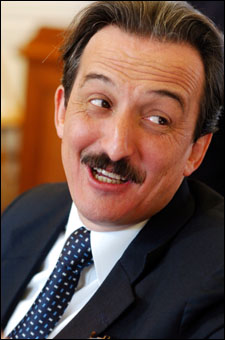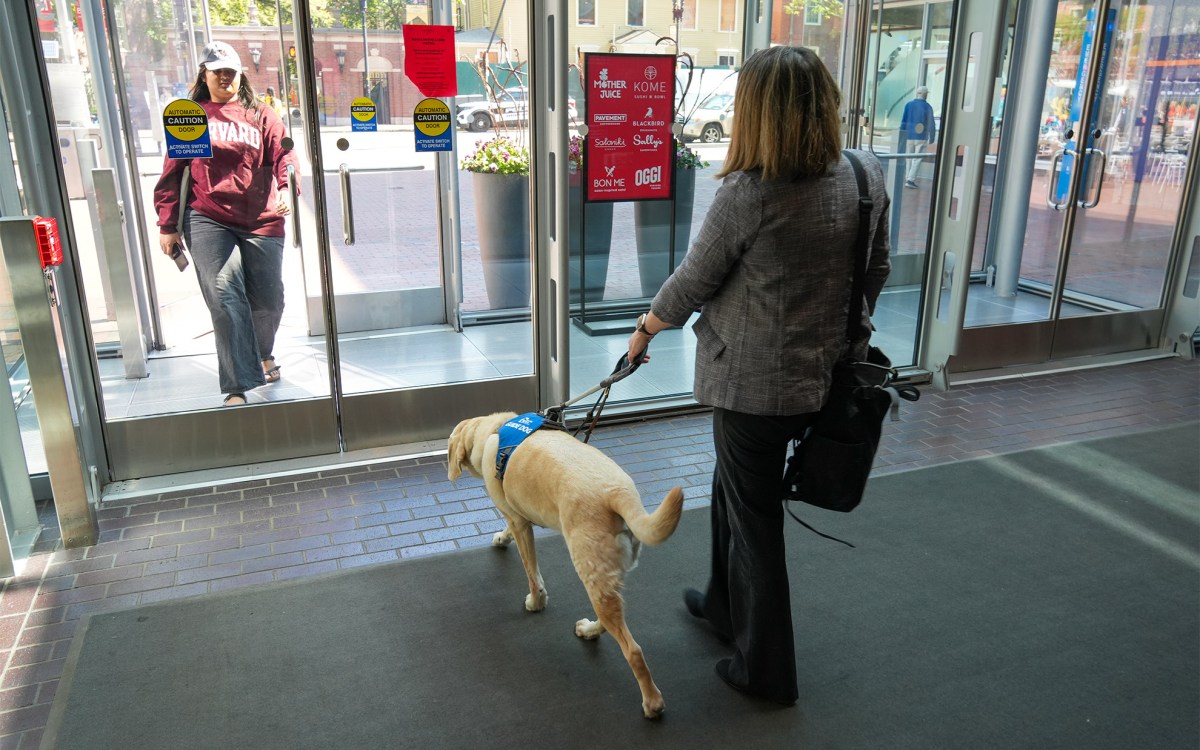Brazil’s President Lula subject of talk
‘Brazil Semester’ features assessment of country¹s new leader

Luiz Inácio Lula da Silva, known as “Lula,” is the first Brazilian president to come from the working class. A former metalworker who left school at 12, Lula led strikes in the 1970s that caused some to call him the Lech Walesa of Brazil. With a group of fellow labor leaders and intellectuals, he founded the Workers Party and ran unsuccessfully for president three times before winning in 2002 with the largest margin of victory in Brazilian history.
Lula’s success has been attributed to the country’s economic stagnation and the readiness of its voters for change. But Lula has disappointed some of his more radical supporters by charting a course for Brazil that is more centrist than expected.
Some of his appointments, however, have been unusual and daring. He named singer-songwriter Gilberto Gil as minister of culture, a choice that might be compared to appointing Bob Dylan head of the U.S. National Endowment for the Arts. And as secretary-general of the Cabinet, he named Luiz Dulci, a professor of Portuguese language and literature as well as one of the founders of the Brazilian Workers Party.
Dulci was at Harvard March 17 to speak on “Two Years of Lula’s Government: Progress and Challenges.” The talk was sponsored by the David Rockefeller Center for Latin American Studies (DRCLAS) and was part of the Brazil Semester at Harvard, a series of Brazil-related events that will continue through May.
Dulci, a youthful-looking man with smooth black hair and a small moustache, spoke with the enthusiasm and animation one might expect from someone accustomed to persuading distracted undergraduates of the rewards to be found in the classics of literature. Speaking in Portuguese with a simultaneous translation by Sergio Ferreira, official interpreter and adviser to President Lula, Dulci gave a spirited defense of the regime’s first two years.
Upcoming events
- April 7, “A Conversation on U.S.-Brazil Relations,” with Lincoln Gordon, U.S. Ambassador to Brazil, 1961-1966, and Elio Gaspari, a leading Brazilian historian and journalist, now a visiting scholar at DRCLAS. 61 Kirkland St.
- April 13, “A Conversation on Gender and Sexuality in Brazil,” with James Green, associate professor of history at Brown University and chair of the Committee on the Future of Brazilian Studies in the United States, and Mala Htun, assistant professor of political science at the New School for Social Research. 61 Kirkland St.
- April 14, “A Conversation on Brazilian Art,” with Jane de Almeida, visiting fellow in the History of Art and Architecture Department, Harvard; Guy Brett, the Peggy Rockefeller Visiting Scholar, spring 2005, and a writer on contemporary art; historian and journalist Elio Gaspari; and visiting professor of Romance Languages and Literatures Nicolau Sevcenko. 61 Kirkland St.
- April 18, “Brazilian Woman in Popular Music,” with music by Valdisa Moura and her band, lecture by Dário Borim Jr., associate professor of Portuguese and Brazilian Studies, University of Massachusetts, Dartmouth. Yenching Auditorium, 2 Divinity Ave.
- April 20, “Brazilian Women’s Movements: A Historial Perspective,” with Roseli Fischmann, visiting scholar of political psychology, Department of Psychology, Harvard. 61 Kirkland St.
- April 22, Two documentary films by Brazilian filmmaker Dorrit Harazim: “Travessia do Escuro” (“Journey Through Darkness”), chronicling the struggles and triumphs of elderly Brazilians learning to read and write, and “Passageiros” (“Passengers”), a look at migrant workers returning home after seeking employment in Sao Paulo. A discussion with the filmmaker will follow the screening. Fong Auditorium, Boylston Hall.All events are free of charge and open to the public. See a complete listing of Brazil-related events.
Lula’s government has addressed a great variety of issues, he said, among them, generating sustainable economic growth, fighting racism, strengthening women’s rights, bringing aid to the poor, reassuring investors who feared an untried left-wing regime, and forging a new leadership role for Brazil in international affairs.
Dulci said that Brazil’s economic woes began before Lula took office, with inflation at 40 percent, government bonds selling at 50 percent of their face value, and international credit reduced to zero. But before he could address these problems, Lula had to convince wary investors and others that he could be trusted to lead.
“In 2003 during a visit to New York, investors told us they had no ideological sympathy for the left. They said, you are a question mark to us.”
But after meetings with hundreds of groups representing business, labor, students, and religious institutions, Lula’s government began to win doubters over. Its success in addressing economic issues can be seen by the increase in the growth rate from 0.5 percent in 2003 to 5.2 percent in 2004, and indications that the 2005 rate will go higher. Inflation, he said, has been reduced to only 6 percent.
Dulci also credited Lula’s administration with creating 2 million new jobs, increasing exports to a record $100 billion, reducing the trade deficit, initiating public-private partnership to build new infrastructure, stimulating agriculture through a new loan program, and gaining control of the national debt.
In the social area, the government has begun fighting poverty through its Zero Hunger policy and has initiated a program to provide poor families with a minimum income as long as they keep their children in school and make sure they are immunized. The government has also put programs in place to aid the elderly and disabled and to provide support for small entrepreneurs, and has launched a program to strengthen the public universities and allow more students to attend.
The government has also tried to forge a more active role for Brazil on the international stage, Dulci said. When Venezuela’s controversial leftist president Hugo Chavez faced a coup attempt in 2002, Brazil responded by organizing an association of regional leaders called “Friends of Venezuela” to help resolve the nation’s problems.
“Our actions are not based on ideological sympathies with these countries,” Dulci said. ‘We have not ideologized issues that are not of an ideological nature. But we also do not accept the idea that developing countries should remain on the sidelines. We want to shift the balance of forces around the world, but to do so without arrogance.”
In answer to those who accuse Lula of abandoning the leftist principles that guided him during the earlier stages of his career, Dulci said that such charges are based on false premises.
“There was nothing in our program about socialism. It was a reform program. We should not be blamed for not doing what we never promised to do.”




